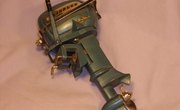
An outboard motor is a small boat engine that attaches to the rear of the boat. Boaters use them in all boating conditions, including in freshwater and saltwater. The design of the motor varies little, even when the motor is used in different water conditions. A motor owner must take great care to prevent corrosion when using outboard motors in saltwater.
Raw Water Cooling
Most outboard motors cooling systems have raw water cooling systems. To keep the engine cool, this system draws in water from the body of water and uses it to complete a heat transfer. The motor then expels water after it has run through the cooling system. Raw water systems are the most common and least expensive type of cooling system. You can use an outboard motor with raw water systems in saltwater or freshwater.
Corrosion
The main disadvantage of raw water cooling systems is using the system in saltwater. The salt will corrode metals and shorten the life of the outboard motor. According to the Long Island Marine Surveyor website, a raw water outboard motor has a life expectancy of 1,000 running hours. Protect your outboard by running freshwater through the cooling system after every saltwater use to flush out any remaining salt deposits. Also hose down the motor to remove salt from its exterior portions.
Freshwater Cooling Systems
Freshwater cooling systems are similar to a car's cooling system. These systems are closed loops that use freshwater or antifreeze to keep the engine cool. These systems are more common on inboard motors and in large, expensive boats. These motors tend to have a longer life span of 1,500 running hours. They are more expensive but have a much higher trade-in and resell value because they last longer.
Anticorrosive Materials
Outboard designed for saltwater feature exterior parts made of different materials, such as stainless steel, that do not corrode as quickly as aluminum parts commonly found on freshwater outboard motors. Sacrificial anodes, which are pieces of metal used to prevent corrosion of the boat and motor, are used in saltwater areas. The anode corrodes so that the boat and motor are spared. Monitor the anode and replace it regularly to maintain protection of all metal boat parts.
References
Writer Bio
Michael Carpenter has been writing blogs since 2007. He is a mortgage specialist with over 12 years of experience as well as an expert in financing, credit, budgeting and real estate. Michael holds licenses in both real estate and life and health insurance.



